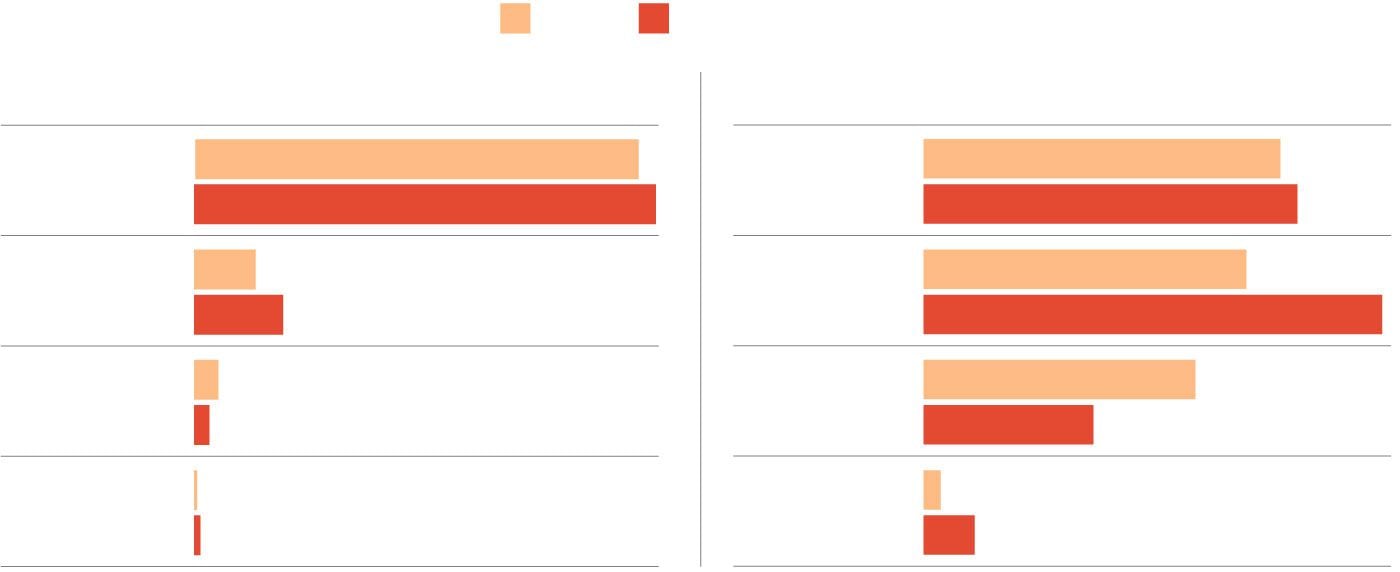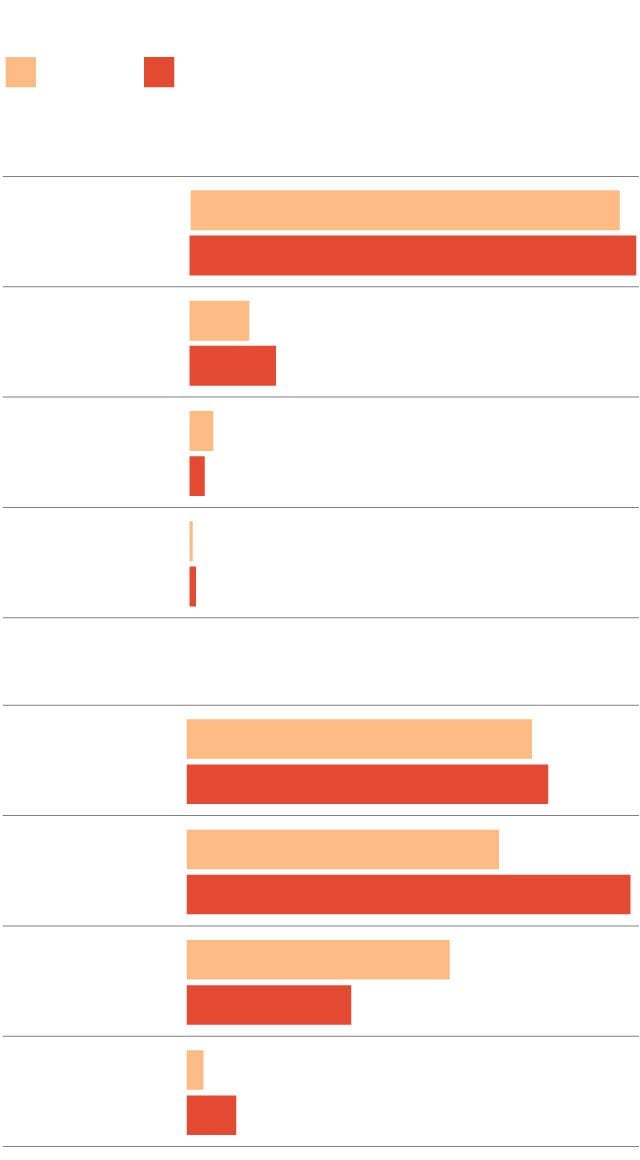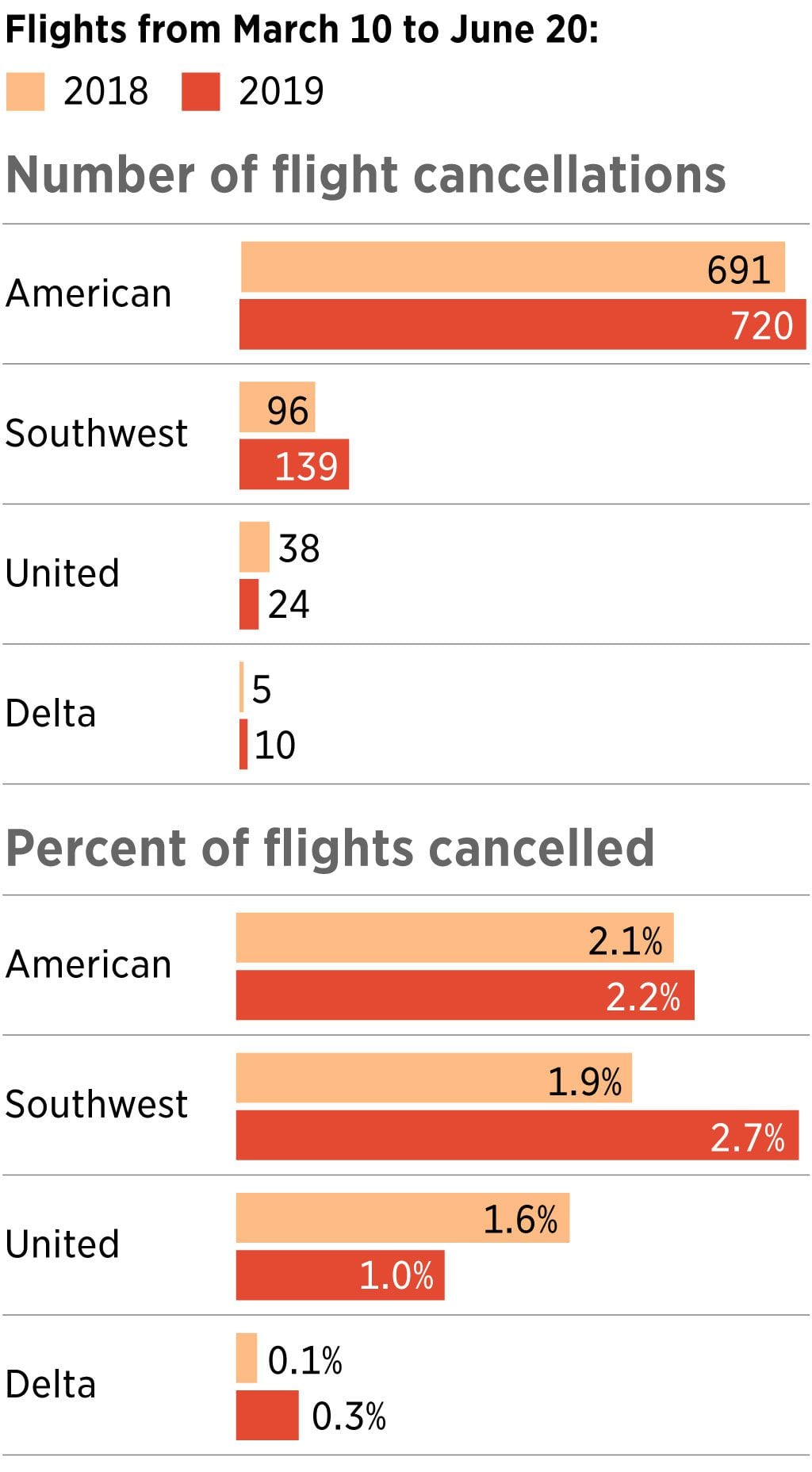American Airlines flight cancellations rise in Philly, leaving passengers stranded and forcing crews to work overtime
American consistently has the most cancellations of any airline flying in and out of Philadelphia, records show.

When Angela Diaz boarded her American Airlines connection in Philadelphia at 1 p.m. on June 29, the plane was supposed to take off in 45 minutes. Instead, she and hundreds of passengers sat on a hot plane with no air conditioning for more than four hours.
The plane returned to the gate several times for repairs. Each time, the passengers were guaranteed a takeoff, and then it was pushed back.
By 5:30 p.m., the flight was canceled altogether.
Diaz’s American Airlines flight from Providence, R.I., to Philadelphia, Miami, and then Cali, Colombia, not only cost her $1,200, but after the plane deboarded in Philadelphia, she also learned that she would have to spend two nights here for the next flight to Cali.
Diaz’s husband, Javier, a platinum member with American, called and got her a flight to Dallas, where she was forced to spend Saturday night and use accumulated points from Hotels.com to pay for the room. The next morning, her American flight from Dallas to Miami was delayed for mechanical issues, and she barely made her connection in Miami. She finally arrived in Colombia on Sunday night.
Diaz’s experience on American Airlines, which accounts for 70 percent of traffic at Philadelphia International Airport, is not an outlier.
American consistently has the most cancellations of any major airline flying in and out of Philadelphia, records show. From March 10 to June 20, the airline canceled 720 flights, which is 2.15 percent of its total departures and arrivals at Philadelphia International, according to FlightAware, a digital aviation company that tracks flights.
This is 29 more cancellations than during the same period last year.
Southwest Airlines, the largest operator of the grounded Boeing 737 MAX 8, had a higher percentage of flight cancellations during the latest three-month period, at 2.7 percent of its 5,104 flights into and out of Philly.
Delta Air Lines had only 0.28 percent of its flights canceled, while United Airlines had 0.96 percent.
Flight Cancellations at Philadelphia International Airport

Flights from March 10 to June 20:
2018
2019
Number of cancellations
Percent of flights canceled
2.1%
691
American
American
2.2%
720
1.9%
96
Southwest
Southwest
2.7%
139
1.6%
38
United
United
1.0%
24
0.1%
5
Delta
Delta
0.3%
10

Flights from March 10 to June 20:
2018
2019
Number of flight cancellations
691
American
720
96
Southwest
139
38
United
24
5
Delta
10
Percent of flights canceled
2.1%
American
2.2%
1.9%
Southwest
2.7%
1.6%
United
1.0%
0.1%
Delta
0.3%

[Can’t see the chart above? Click here to view the complete article.]
Representatives for American’s pilots and flight attendants blasted the airline, saying the cancellations have been happening for years nationwide and can be traced to an outdated scheduling and information technology system.
Dennis Tajer, an American pilot and spokesperson for the Allied Pilots Association, which represents the company’s pilots, said airlines such as Delta and Southwest have innovative scheduling programs that automatically reroute and reschedule flights delayed by weather or mechanical issues. But American’s schedule has to be manually updated, which invites human error and takes much longer, he said.
“The other airlines are battling the same storm, but they’re back up and running in hours. American takes two to three days to get back and running,” Tajer said. American’s executives “have not invested in that and it will take them years to get that up and running. ... It’s the world’s largest airline and you can’t figure out how to do day-to-day operations? We are at a loss to understand why management cannot get this done.”
An airline spokesperson did not dispute the criticism and said the airline is working on making improvements. “While American recognizes our performance last year left room for improvement and acknowledges there is still more work to do, we’ve been working hard to improve processes and provide the support our team members need to get our customers where they need to go,” said Andrew Trull, an American spokesperson. “We continue to work collaboratively to enhance the experience for our customers and thank our team members for the care they provide.”
Flight cancellations not only leave passengers stranded and stressed, but also force the airline crew to work overtime.
“It’s demoralizing,” said Tajer, who has been a pilot for American for 27 years. “It’s taking you away from your personal life and your family.”
Tajer said it’s becoming more common to see pilots forced to fly overtime because of scheduling issues. “In general, about a third of the time, you’re not finishing your trip on time," he said. Tajer lives in Chicago, but frequently captains domestic flights through Philadelphia.
“It’s demoralizing on a professional level. You’re wearing a uniform that says, ‘I am American Airlines,’ and when they let you down, it’s embarrassing. You get resentful toward someone who pushes you out onto a stage where the audience is gnashing its teeth at you.”
The flight attendants’ union has filed multiple complaints with the company about its crew being forced to work long hours that break employee contracts.
“We have seen many abuses and violations at the hand of our company on our crew’s schedule,” said Lori Bassani, national president of the Association of Professional Flight Attendants, which represents American’s attendants.
“I can’t believe how regularly this happens,” Bassani said of delays. “Our flight attendants are very upset. Their lives have been turned upside down.”
Despite scheduling problems, American Airlines continues to expand nationally. It added 387 more flights between March and June 2019 compared with 2018, and a total of 980 flights in the last three years, according to Trull. The airline had 132,009 flights in 2018, up from 128,935 in 2017, including regional airlines, records show.
While cancellations for American’s planes rose in the last year, when including the company’s three regional carriers — Piedmont, Republic, and Pacific Southwest, which flew 57 percent of the airline’s Philadelphia traffic — there were 555 fewer cancellations from 2018 to 2019, Trull noted.
American Airlines consistently receives low rankings on the Airline Quality Rating report, which is a study of performance and quality of the nation’s largest airlines. The annual report examines mishandled baggage, consumer complaints, on-time performance, and involuntary denied boardings to generate statistics about airline performance.
American was ranked eight out of nine airlines in the 2019 report, coming in behind seventh-ranked Spirit Airways for the first time. The only one below American was Frontier. The report states that American’s on-time arrivals and baggage handling performance both declined from 2017 to 2018.
American’s on-time arrivals fell from 80.4 percent in 2017 to 78.4 percent in 2018, the report said.
“If I were an American Airlines executive, I would be embarrassed to now be ranked [overall] behind Spirit,” said Brent Bowen, one of the report’s creators and a professor of aeronautical science at Embry-Riddle Aeronautical University in Prescott, Ariz.
Bowen said that all airlines face issues regarding maintenance and weather, but that the report “shows that American is not adapting as well as these other airlines.”
Although the company has grown, its stock has fallen significantly in the last year and a half. In January 2018, American’s shares closed as high as $58.47. On Friday, they closed at $32.46.
“Bigger is not always better,” Bowen said. “The bigger an airline is, the more points of failure incur.”
Passengers on the canceled flights experience continued frustration.
Jackie Brown, 74, had a connecting flight in Philadelphia during her trip from Manchester, U.K., to Charleston, S.C., for her daughter, Hannah’s, birthday.
Brown boarded her flight about 2:30 p.m. on June 29, but the plane was stuck on the runway for about three hours because of a storm. Eventually, the plane was deboarded and the flight canceled. Passengers were told there were no more flights into Charleston that day or the next. The passengers were eager to retrieve their luggage, but Hannah Brown said the American staffers could not give her mother any information on where her bags were.
“There were hundreds of people waiting around looking for answers. They had no way of dealing with hundreds of people,” said Hannah, who lives in New York.
Hannah went online and purchased her mother a flight on Frontier into Charleston for the next morning, which cost about $200.
She said American gave her mother a hotel voucher in Philadelphia, but when she got to the hotel, it was full. . She was finally sent to another hotel at about 2 a.m.
“They didn’t organize things well and totally made things worse than it needed to be,” said Hannah. “It storms all the time here, so how do you not have a plan in place?”